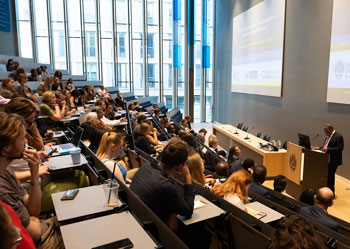News & Events
 Find the latest news below, and our event calendar on the right.
Find the latest news below, and our event calendar on the right.
Would you like to stay updated on our latest research news, publications and events? Please subscribe to our monthly newsletter!
Posted on 9 November 2011, last modified on 9 October 2023
09 September 2022
The ASCL celebrated its 75th anniversary on 8 September in Museum Volkenkunde. We look back on a festive and interesting day with many partners. Take a look at the photos and read the report!
07 September 2022
The Stephen Ellis Annual Lecture will be given by Megan Vaughan, Professor of African History and Health at University College London. There are multiple stories to be told about the course and impact of COVID-19 in Africa. Prof. Vaughan will examine the impact of global actions, inactions and inequalities.
07 September 2022
Algemeen Dagblad interviewde Jan Abbink en Chibuike Uche over 75 jaar Afrika-Studiecentrum, de rol van handel tussen Afrikaanse landen en Nederland - in 1947 en nu -, en de maatschappelijke betekenis van het Afrika-Studiecentrum.
05 September 2022
On 5 September 2010, South African writer, university teacher and journalist Lewis Nkosi died in Johannesburg at the age of 73. He spent 30 years in exile as a consequence of restrictions placed on him and his writing by the Suppression of Communism Act and the Publications and Entertainment Act passed in the 1950s and 1960s. Read the Library Weekly!
02 September 2022
Pages
18 February 2026
25 August 2026 to 27 August 2026

